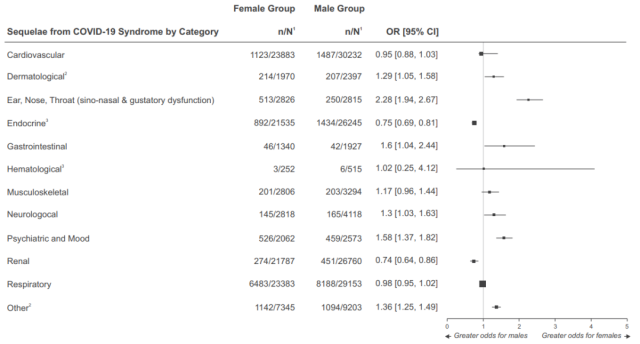Women at higher risk of long-term sequelae after infection with COVID-19
- Normal Liver Cells Found to Promote Cancer Metastasis to the Liver
- Nearly 80% Complete Remission: Breakthrough in ADC Anti-Tumor Treatment
- Vaccination Against Common Diseases May Prevent Dementia!
- New Alzheimer’s Disease (AD) Diagnosis and Staging Criteria
- Breakthrough in Alzheimer’s Disease: New Nasal Spray Halts Cognitive Decline by Targeting Toxic Protein
- Can the Tap Water at the Paris Olympics be Drunk Directly?
Women at higher risk of long-term sequelae after infection with COVID-19
- Should China be held legally responsible for the US’s $18 trillion COVID losses?
- CT Radiation Exposure Linked to Blood Cancer in Children and Adolescents
- FDA has mandated a top-level black box warning for all marketed CAR-T therapies
- Can people with high blood pressure eat peanuts?
- What is the difference between dopamine and dobutamine?
- How long can the patient live after heart stent surgery?
Women at higher risk of long-term sequelae after infection with COVID-19.
The new coronavirus usually infects humans through the respiratory tract and causes damage to the respiratory system and various organs of the human body.
Since the first outbreak at the end of 2019, the novel coronavirus is still raging around the world, causing great negative impact on the world economy and society.
More than two years after the epidemic, more and more evidence has shown that the COVID-19 is not just a respiratory disease, but affects multiple tissues and organs of the human body.
Common sequelae include loss of smell, fatigue, breathing difficulties, cognitive decline, and even depression.
On June 20, 2022, Johnson & Johnson researchers published a review paper titled: Sex differences in sequelae from COVID-19 infection and in long COVID syndrome: a review in the journal Current Medical Research and Opinion.
The paper, based on an analysis of more than 1.3 million COVID-19 patients, shows that women are more likely than men to develop long-term COVID-19 (Long COVID) , the risk is 22% higher, and they will show different types of symptoms.
Specifically, female patients were more likely to have mood disorders such as depression, as well as conditions such as ENT symptoms, musculoskeletal pain, and respiratory symptoms, while male patients were more likely to have diabetes and kidney disease.

Long-term COVID-19 sequelae, a syndrome in which complications persist for more than 4 weeks and sometimes months after initial infection.
In the study, the researchers searched 35 relevant literature, including 23 articles on COVID-19 sequelae (symptoms lasting <4 weeks) and 12 long-term sequelae (symptoms lasting >4 weeks) .
A total of 1,393,355 COVID-19 patients and long-term COVID-19 sequelae patients were included.
Research has found that women are more likely than men to suffer from long-term COVID-19 sequelae, and experience very different symptoms.
The researchers observed that women develop faster and more robust innate and adaptive immune responses that protect them from initial infection and severity.
However, it can also put them at a higher risk of overreaction, which can cause the immune system to attack the body instead of protecting it and lead to long-term infections.
The researchers found that female patients were more likely to experience mood disorders such as depression, as well as conditions such as ENT symptoms, musculoskeletal pain and respiratory symptoms.
Meanwhile, male patients were more likely to suffer from diabetes and kidney disease.
 Long-term COVID-19 comparison between women and men
Long-term COVID-19 comparison between women and men
Differences in immune system function between women and men may be an important driver of gender differences in long-term COVID-19 sequelae , researchers say .
In conclusion, this study reveals gender differences in long-term COVID-19 sequelae and is critical for identifying and rationally designing effective treatments.
Reference:
https://doi.org/10.1080/03007995.2022.2081454
Women at higher risk of long-term sequelae after infection wiht COVID-19.
(source:internet, reference only)
Disclaimer of medicaltrend.org
Important Note: The information provided is for informational purposes only and should not be considered as medical advice.



